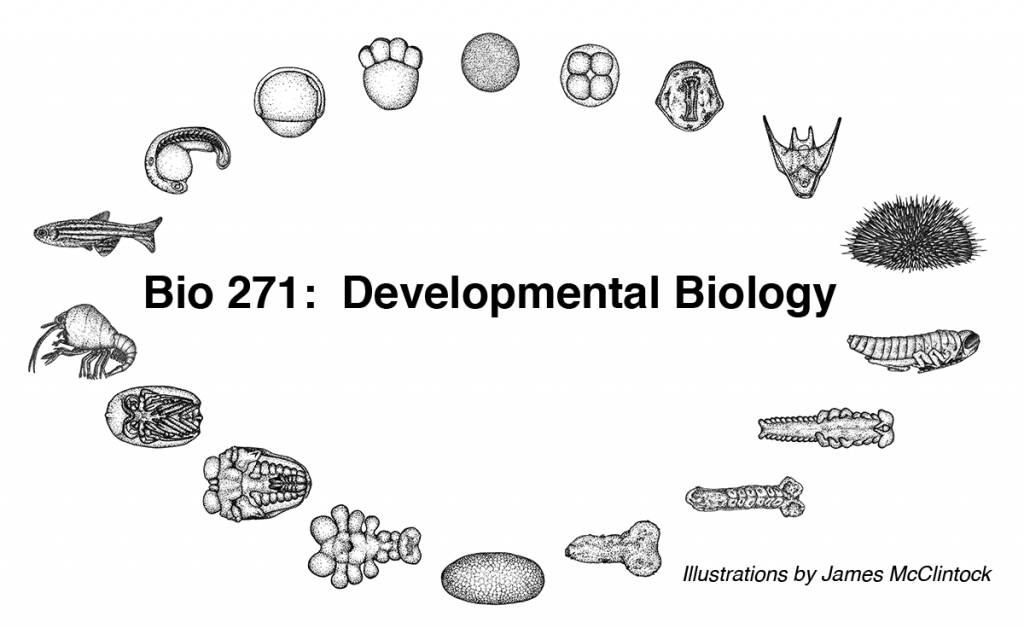Described below are four of the courses Greg Davis teaches at Bryn Mawr College.

Course Description: This course investigates cellular and molecular mechanisms that regulate development. Topics include fertilization, cleavage, gastrulation, axis specification, cell specification and differentiation, morphogens, patterning and a little organogenesis. Laboratory sessions focus on observation and experimental manipulation of early vertebrate and invertebrate embryos, as well as reading and discussing research papers in developmental biology. Although the focus will be on animal development, I have included some material on plants. As much as possible, I will take a comparative approach in both the lecture and the lab, attempting to convey the incredible diversity (and similarity!) by which organisms come into being.
Goals: Our primary goals for this course will be for you:
• To become familiar with the basic processes of embryology, cell differentiation and pattern formation and, in so doing, gain an appreciation of the developmental process as dialectic between cells, their genes and their environments.
• To become adept at evaluating the extent to which different types of descriptive and experimental evidence support proposed models of development, as well as proposing appropriate experiments to address new questions.
• To be able to effectively communicate the above, both orally and in writing.
Biol 236: Evolution
Course Description: “Evolution” is a lecture/discussion course on evolutionary theory and its applications. The course will include the history of evolutionary thought and the major facets of contemporary theory, including molecular evolution, the increasing relevance of developmental biology and the application of evolutionary theory to medicine. The course is cross-listed in Anthropology, Biology, and Geology.
Learning Objectives: Students are expected to become proficient in their understanding of the significance of evolutionary theory in a multidisciplinary context and to apply this proficiency in their discussions with others less familiar with the process of evolution.
Biol 394: Senior Seminar in Evolutionary Developmental Biology
A plausible argument could be made that evolution is the control of development by ecology. Oddly, neither area has figured importantly in evolutionary theory since Darwin, who contributed much to each. This is being slowly repaired for ecology…but development is still severely neglected.
Leigh Van Valen, 1973
Course Description: The emerging discipline of evolutionary developmental biology, or “evodevo”, is the result of a relatively recent interest in using modern molecular and genetic tools to understand the relationship between evolutionary and developmental biology. Beyond this admittedly vague description, it is difficult to make generalizations about the field. There are, in essence, many flavors of evolutionary developmental biology, and roughly the first half course is devoted to giving you a taste of the major flavors. Students will be asked to write a paper in the form of a grant proposal on an evodevo topic of their choosing, orally present this proposal to the department, and defend the proposal to the course instructor and one other faculty member. The support provided by the class will come in the form of group discussion on your chosen topic, feedback on a “draft” of your presentation, and feedback on drafts of your thesis.
Goals: Aside from learning about evolution and development, this course is meant to be a forum in which each of you can pursue a particular topic in depth and actively participate in science as a creative process. The intended result is that you will become:
1. More adept at weighing evidence in favor of a hypothesis, as well as identifying shortcomings in scientific arguments and devising experiments to address them.
2. Comfortable with giving and receiving constructive criticism.
3. More adept at communicating a scientific problem and your proposed solution, both orally and in writing.
Biol 214: History of Genetics and Embryology

Course Description: This course provides a general history of genetics and embryology from the late 19th to the mid-20th century with a focus on the role that women scientists and technicians played in the development of these sub-disciplines. We will look at the lives of well known and lesser-known individuals, asking how factors such as their educational experiences and mentor relationships influenced the roles these women played in the scientific enterprise. We will also examine specific scientific contributions in historical context, requiring a review of core concepts in genetics and developmental biology. One facet of the course will be to look at the Bryn Mawr Biology Department from the founding of the College into the mid-20th century.

